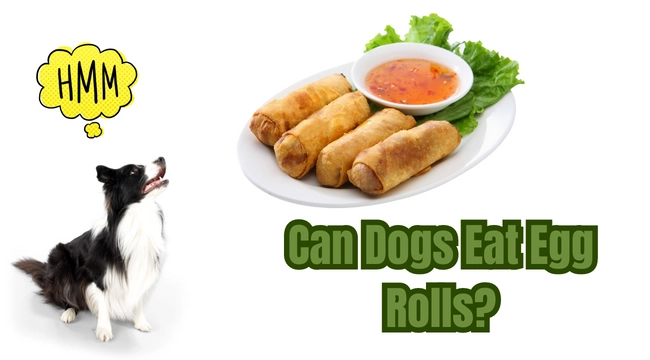Can Dogs Enjoy Egg Rolls? Everything You Need to Know

Dogs are known for their curious palates and unrelenting enthusiasm for sharing human food. As pet owners, we often wonder which of our favorite treats are safe to share with our furry friends. One such popular question is: Can dogs enjoy egg rolls? While the idea of sharing these delicious, crispy appetizers with our canine companions might seem harmless, it’s essential to delve into the specifics before offering them a bite.
Egg rolls, a staple in many Asian cuisines, are typically filled with a mixture of vegetables, meat, and seasonings, all wrapped in a thin dough and fried to perfection. Their tantalizing aroma and satisfying crunch are enough to make any dog beg for a taste. However, as responsible pet owners, we must consider the ingredients, preparation methods, and potential health implications for our dogs.
In this article, we’ll explore the various aspects of feeding egg rolls to dogs, including the nutritional value, potential hazards, and healthier alternatives. By the end, you’ll have a clearer understanding of whether this tasty treat can safely be part of your dog’s diet or if it’s best left on your own plate. Join us as we unravel the facts and myths surrounding dogs and egg rolls, ensuring you make informed decisions about your pet’s nutrition and well-being.
Potential Health Risks
High Fat Content
Egg rolls are typically deep-fried, which significantly increases their fat content. Consuming high-fat foods can pose several health risks for dogs:
- Obesity: Regular consumption of high-fat foods can lead to obesity, which in turn can cause a host of other health issues such as diabetes, joint problems, and heart disease.
- Pancreatitis: The high fat content in egg rolls can also lead to pancreatitis, an inflammation of the pancreas that can be extremely painful and potentially life-threatening for dogs.
Sodium Levels
Egg rolls often contain high levels of sodium due to the addition of ingredients like soy sauce and other seasonings. Elevated sodium intake can be particularly harmful to dogs:
- Salt Poisoning: Dogs have a much lower tolerance for sodium than humans. Consuming foods high in sodium can lead to salt poisoning, with symptoms including vomiting, diarrhea, tremors, seizures, and even death in severe cases.
These potential health risks highlight the importance of being cautious when considering egg rolls as a treat for dogs.
Veterinary Insights
General Advice on Human Food
Veterinarians typically advise against feeding dogs high-fat, high-sodium human foods. The emphasis is on providing a balanced diet that meets the specific nutritional needs of canines. Human foods often contain ingredients and seasonings that are unsuitable for dogs and can lead to various health issues.
Specific Concerns About Egg Rolls
Egg rolls, in particular, pose several risks due to their high fat and sodium content. Veterinarians highlight the potential dangers associated with these components, such as the increased risk of obesity, pancreatitis, and salt poisoning. Additionally, common ingredients in egg rolls, like onions and garlic, are toxic to dogs and can cause severe health problems, including gastrointestinal upset and damage to red blood cells.
Recommendations for a Healthy Diet
Veterinarians recommend sticking to dog-specific treats and foods to ensure that pets receive the appropriate nutrients without the risks associated with human foods. They advocate for consulting with a veterinarian before introducing any new foods to a dog’s diet. This helps ensure that any additions are safe and beneficial for the dog’s overall health.
Signs of Adverse Reactions
Digestive Issues
Adverse reactions to foods often manifest as digestive problems. Common symptoms include vomiting, diarrhea, and bloating. These symptoms indicate that the digestive system is struggling to process certain foods. Consuming rich and unfamiliar foods can exacerbate gastrointestinal distress, leading to discomfort and potential health issues.
Food Allergies
Food allergies can also present with gastrointestinal symptoms, but they often include other signs such as skin irritations, itching, and hives. In severe cases, an allergic reaction can cause anaphylaxis, a life-threatening condition requiring immediate medical attention.
Pancreatitis
Pancreatitis is a serious condition that can be triggered by the consumption of high-fat foods. It involves the inflammation of the pancreas and is characterized by symptoms such as severe abdominal pain, vomiting, and lethargy. This condition requires prompt veterinary care to manage and alleviate the symptoms.
Dietary Intolerance
Some pets may have dietary intolerances that are less severe than allergies but still cause discomfort. Symptoms of dietary intolerance can include chronic diarrhea, gas, and bloating. Identifying and eliminating the problematic food from the diet can help alleviate these symptoms.
Long-term Health Effects
Continual exposure to foods that cause adverse reactions can lead to long-term health issues. Chronic digestive problems can result in malnutrition and weight loss, while repeated episodes of pancreatitis can cause permanent damage to the pancreas, affecting overall health and quality of life. It’s important to monitor your pet’s reactions to different foods and consult with a veterinarian to ensure their diet is safe and nutritious.
Safe Alternatives to Egg Rolls
Dog-Friendly Vegetables
Plain, cooked vegetables are a great alternative to egg rolls. Options like carrots and green beans provide essential nutrients and are safe for dogs to consume. These vegetables can be steamed or boiled without any added seasoning to make them more palatable for your pet.
Lean Meats
Lean meats such as chicken or turkey are excellent snack choices for dogs. Ensure the meat is cooked thoroughly and free from any seasoning, spices, or sauces that could harm your pet. These protein-rich snacks can help maintain your dog’s muscle health and provide energy.
Homemade Treats
Creating homemade treats is a fantastic way to ensure your dog is eating safe and healthy snacks. Consider making dog-friendly “egg rolls” using lean meat, carrots, and peas wrapped in rice paper. Baking these treats instead of frying will reduce their fat content, making them a healthier option for your pet.
Commercial Dog Treats
There are many commercial dog treats available that are formulated specifically for canine dietary needs. When selecting these treats, choose those that are low in fat and free from harmful ingredients. Reading the labels carefully will help you find the best options for your dog.
Nutritional Balance
Ensuring a balanced diet for your dog is crucial for their overall health. Incorporate a variety of safe vegetables and lean meats into their diet, along with commercial dog treats, to provide a well-rounded nutritional profile. Always consult with your veterinarian to tailor your dog’s diet to their specific health needs and preferences.
Guidelines for Introducing New Foods
Balanced Diet Importance
Maintaining a balanced diet is crucial for a dog’s overall health and well-being. Dogs require a specific mix of nutrients, which is often best provided through high-quality commercial dog food. While it might be tempting to share human foods with your dog, these should be limited to avoid unbalancing their diet and potentially causing health issues.
Introducing Foods Safely
When introducing new foods to your dog’s diet, it’s important to proceed gradually. Start with small portions to monitor how your dog reacts to the new food. This careful approach helps to identify any adverse reactions or allergies early on, minimizing the risk to your dog’s health.
Monitoring for Reactions
Closely observe your dog for any signs of digestive upset, such as vomiting, diarrhea, or changes in appetite. Additionally, watch for any behavioral changes or physical symptoms like itching or skin rashes. Early detection of adverse reactions ensures prompt action can be taken to eliminate the problematic food from their diet.
Consulting a Veterinarian
Before adding any new foods to your dog’s diet, always consult with your veterinarian. Vets can provide tailored advice based on your dog’s specific health and dietary needs. They can help identify safe food options and recommend appropriate serving sizes to ensure your dog’s nutritional requirements are met without compromising their health.
Maintaining Nutritional Balance
Ensure that the introduction of new foods does not disrupt the overall nutritional balance of your dog’s diet. Complement their regular meals with the new food in a way that supports their health. Continually consulting with your vet and monitoring your dog’s response will help maintain a balanced and healthy diet.




